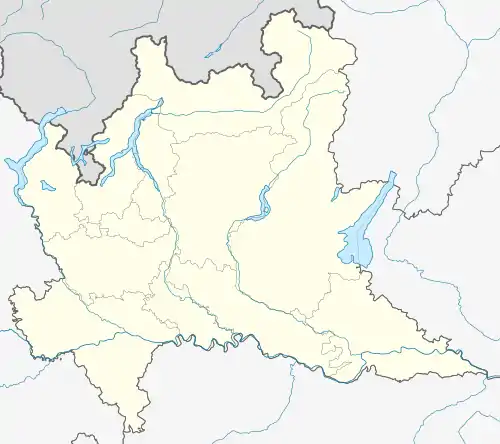Monno
Mòn | |
|---|---|
| Comune di Monno | |
.jpg.webp) Monno | |
Location of Monno | |
 Monno Location of Monno in Italy  Monno Monno (Lombardy) | |
| Coordinates: 46°12′48″N 10°20′26″E / 46.21333°N 10.34056°E | |
| Country | Italy |
| Region | Lombardy |
| Province | Brescia (BS) |
| Area | |
| • Total | 30.70 km2 (11.85 sq mi) |
| Elevation | 1,066 m (3,497 ft) |
| Population (2011)[2] | |
| • Total | 563 |
| • Density | 18/km2 (47/sq mi) |
| Demonym | Monnesi |
| Time zone | UTC+1 (CET) |
| • Summer (DST) | UTC+2 (CEST) |
| Postal code | 25040 |
| Dialing code | 0364 |
| Patron saint | San Pietro e San Paolo |
| Saint day | 29 giugno |
| Website | Official website |
.JPG.webp)
San Pietro e Paolo Church
Monno (Camunian: Mòn)[3] is a village and comune in the province of Brescia, in Lombardy. It is situated above the right bank of the river Oglio, in upper Val Camonica.
Geography
Location
Monno is located along the road which from Val Camonica goes to Mortirolo Pass.
Monuments and attractions
Religious architecture
The churches of Monno are:[4]
- San Pietro e Paolo Church, built on the ruins of a 14th-century building. The gate, which dates back to 1629, is made of marble of Vezza. In 1895, Antonio Guadanini painted on the apse the Annunciation with the Evangelists in the hackle.[5]
- San Francesco Oratory – its structure dates back to the 16th century; it was designated as a cinema.
- San Sebastiano e Fabiano Church, built on an older building.
- San Brizio Church
Military architecture
- Castello di Monno, owned by the Federici family and then the Corata family which disappeared without heirs in 1733. There are no traces, except for the base of San Pietro e Paolo Church.[6]
- WWII cannon on the peak of Monte Pagano.
Places of natural interest
- Conca of Mortirolo Pass.
.jpg.webp)
Location of Monno in Val Camonica
References
- ↑ "Superficie di Comuni Province e Regioni italiane al 9 ottobre 2011". Italian National Institute of Statistics. Retrieved 16 March 2019.
- ↑ "ISTAT". Archived from the original on 2016-03-03. Retrieved 2014-05-01.
- ↑ Ertani, Lino (1980). Dizionario del Dialetto Camuno e di Toponomastica. Artogne: Tipografia M. Quetti. p. 156.
- ↑ Fontana, Eugenio (1984). Terra di Valle Camonica. Industrie Grafiche Bresciane. p. 143.
- ↑ Valzelli, Giannetto. Antonio Guadagnini. Comune di Esine. p. 175.
- ↑ AAVV, Itinera - 4 - Castelli, torri e fortificazioni, Breno, Tipografia camuna, 2003, p. 52
This article is issued from Wikipedia. The text is licensed under Creative Commons - Attribution - Sharealike. Additional terms may apply for the media files.
.jpg.webp)